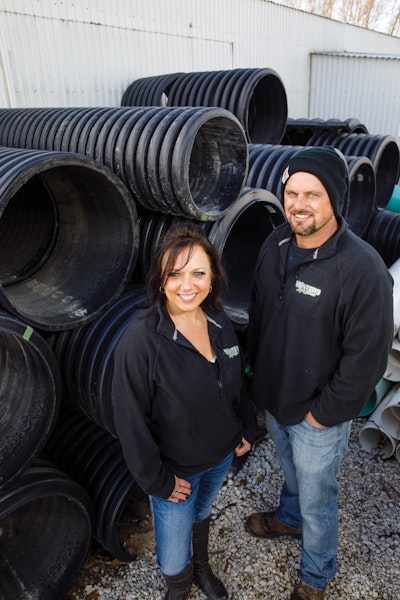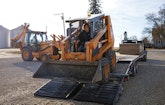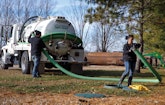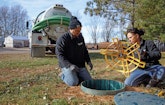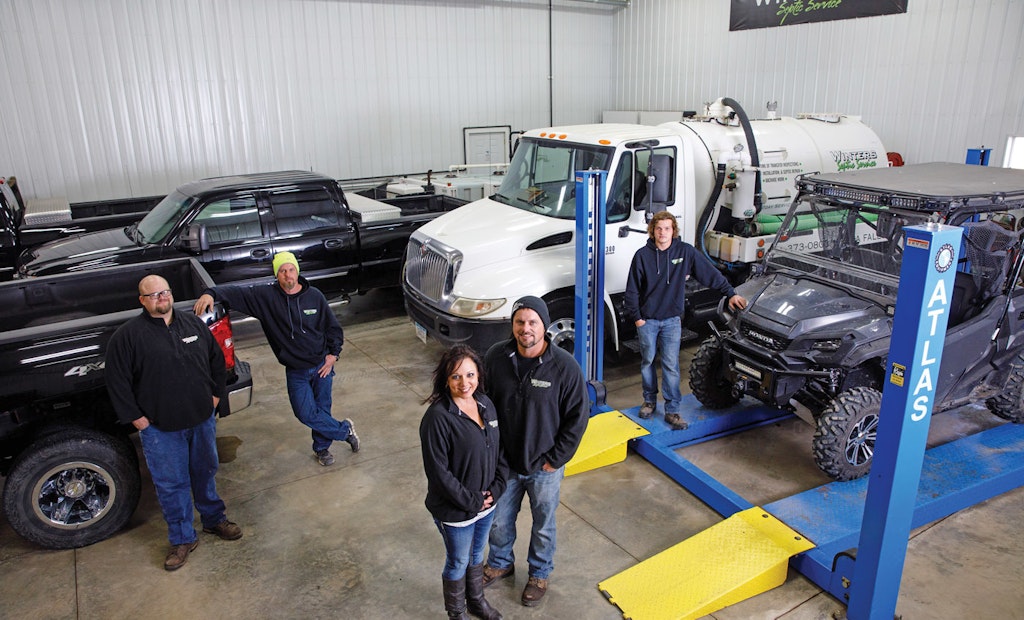
The team from Winters Septic Service includes (from left) Tony Winters, Tyson Winters, Amanda Winters, Trent Winters and Layne Aldinger. Shown in the background is a 2003 International 4300 with a 1,600-gallon steel tank and Masport pump. The company also owns five Chevy pickups and a Honda all-terrain vehicle.
A mere nine years ago, Amanda Winters was running her own hair salon and didn’t know a baffle from a biomat. Today she and her husband, Trent Winters, are the owners of a thriving, well-diversified business — Winters Septic Service in Iowa Falls, Iowa — and she’s the president of the Iowa Onsite Waste Water Association.
How the couple traveled from where they were in 2009 to where they stand today illustrates the value of taking calculated risks and recognizing opportunities presented by underserved markets. It also reflects the importance of investing in good equipment, providing great service and adding complementary ancillary services to create new revenue streams. And Amanda Winters says educating and communicating with customers has been a key factor in the company’s growth.
“We take time to educate our customers — assuring them that they’re a priority,” she says, noting that it’s not unusual for her and Trent Winters to spend an hour or more during an initial meeting with customers to talk about a septic system installation. “We believe it’s worth taking extra time when we’re on site to talk with them and answer their questions — make them feel confident that they’re making the best decision by going with us.
“At the end of the day, it’s their investment and they’ll spend it on whoever they feel the most comfortable with,” she concludes.
GET ANOTHER ESTIMATE
To Winters, explaining the “why” to customers is just as important as the “what.” Instead of telling a customer just where they think a tank should be located, for example, they will explain why, too. That not only shows customers they’re dealing with a knowledgeable and competent contractor, it also indicates respect for the significant investment the customer is about to make, she says.
“We also encourage people to get more than just one bid for an installation,” she adds. “Getting other bids assures them we’re not out to cheat them … shows them we’re just trying to make a living — pay our bills and provide for our family — not looking to strike it rich. Honesty is huge.”
But when they tell customers to get other bids, they also emphasize the importance of getting estimates that provide apples-to-apples comparisons: same tank size, same type of septic system, same components. “Too often the comparisons are more like apples to oranges,” she says.
Winters says that customers appreciate their approach. As proof, she notes that it’s not unusual for customers to pick Winters Septic to do the job — even if they submit a higher bid than a competitor. “When that happens, they’re choosing us because of our customer service,” she asserts. “Taking the extra time pays off in the long run.”
On the other hand, the couple rarely matches competitors’ bids. Instead, they emphasize the added value customers receive for the additional cost. “Undercutting is simply bad business,” Winters says. “We know the cost of our materials and the value of our workmanship, and we price our jobs accordingly from the start. Once you start undercutting, the word travels fast in a small community. You ultimately compromise your businesses integrity and reputation.”
SMALL-TOWN SUPPORT
Living in a small community was a boon to the couple when they decided in 2009 to go from a part-time septic-services operation to a full-time operation. At that point, Trent Winters worked as a manure-control specialist at a local hog farm and Amanda Winters owned and operated a multichair salon in Iowa Falls.
Trent Winters already had some experience in related industries. He occasionally helped his father, Eldon, pump hog manure pits and also assisted a friend with drain-cleaning work every now and then. To bring in some extra revenue, Trent Winters earned a state-pumping license. Then he started pumping tanks for neighbors on weekends, using a trailer-mounted pumping unit he designed and fabricated.
When Trent Winters reached a breaking point after years of working 80 hours a week, the couple started thinking about establishing their own business. “Trent was sick of missing the kids growing up, starting at 6 a.m. and getting home at 11 p.m. six to seven days a week,” Amanda Winters recalls. “And we’d just had our third child that February.” Another catalyst was the passage of a state law requiring time-of-transfer inspections of septic systems, which they felt would boost demand for inspections and pumping.
So Trent Winters got certified as an inspector and started Winters Septic as a full-time operation in July 2009. “Diving into the unknown with three small kids was daunting, especially since he was leaving a secure salary and benefits,” she says. “It was a huge leap of faith for us. We took out some loans and hoped it would work out.”
That’s where the small-town aspect came into play. First off all, the nearest pumping competitor was 30 miles away. “There was a niche waiting to be filled, and Trent is very savvy,” she notes. “He has an amazing ability to do what needs to be done.” Secondly, word gets around quickly in a small town. “Things just took off,” she says. “When there’s a big, new vehicle in town, everyone notices. When you drive a big truck through town with ‘Winters Septic’ on it, it definitely catches people’s eyes.”
About five years after formally establishing the full-time business, Winters quit her job to help Trent Winters. “I unexpectedly found the wastewater industry intriguing, so I became a time-of-transfer inspector and obtained the certified installer of wastewater treatment systems credential,” she says.
OPENING SERVICE LINES
The couple had a general vision of how the company could grow, but no formal business plan. Instead, things just happened organically, spurred by word-of-mouth referrals and repeat business. “The biggest thing is that Trent and I are very hands-on,” Winters explains. “All of our customers deal directly with him or me, and we gain their trust through service and education.”
In 2012, the company added drain cleaning to its list of services, which further boosted revenue. “We wanted to become a complete one-stop septic shop, plus drain cleaning helped generate revenue in wintertime,” Winters explains.
“Offering multiple services makes life simpler for our customers,” she continues. “After they gain trust in you, they’d rather use you than have a lot of different contractors coming in and out. All our services go hand in hand.”
One thing they avoid is telling customers after an inspection that their system is failing and needs to be replaced. To remain aboveboard and avoid conflict of interest, the couple prefers to let the county sanitarian give a system a passing or failing grade. Then the consumer can make their own decision about which companies they want to call for bids on a system installation.
Taking photos is a key part of system inspections, Winters says, noting that documentation is critical. “We’ve even started to videotape things like hydraulic load tests so that we have visual proof if, say, the lines are backing up into the D-box,” she explains. “I just use a cellphone video camera. It provides proof for the homeowner and protection for the inspector. Video doesn’t lie.”
IN THE GARAGE
As the company grew, so did its inventory of equipment. Today the company owns one septic service truck: a 2003 International 4300 with a 1,600-gallon steel tank and Masport pump. It also owns three Crust Busters tank agitators, three laser levels from Spectra Precision/Trimble, two Case backhoes, a Bobcat mini-excavator, a Case skid loader and a 2004 International tandem-axle dump truck with a 20-cubic-foot dump body. Three 22-foot tilt-bed trailers and one 32-foot gooseneck trailer, all made by PJ Trailers, round out the list of installation-related equipment.
On the drain cleaning side of the business, the company relies on a 2005 US Jetting 4018 trailer-mounted jetter with a 600-gallon water tank (4,000 psi at 18 gpm); a RIDGID 3100 cart-mounted jetter (3,000 psi at 5.5 gpm); six RIDGID cable drain cleaning machines; three RIDGID NaviTrack locators; two RIDGID SeeSnake pipeline inspection camera systems; and an enclosed trailer made by Doolittle Trailer. In addition, Winters Septic owns five Chevy pickup trucks.
Septic system installations generate roughly 45 percent of the company’s annual revenue, with pumping kicking in another 40 percent and drain cleaning contributing the balance. The company installs 40 to 50 systems a year, mostly for residential customers. Failing systems, new-home construction, or systems that illegally discharge into ditches or field tiles are the main drivers of demand for installations, Winters says.
The company uses concrete tanks made or sold by Wieser Concrete or Midwest Pipe Supply, mostly 1,250- or 1,500-gallon capacities. They also prefer 36-inch Advanced Drainage Systems Arc low-profile leachfield chambers. They also use Polylok risers or EZset risers made by Infiltrator Water Technologies.
The company installs a variety of systems. But it installs fewer and fewer conventional systems in new-home applications. For homes where soil absorption systems aren’t an option, the company opts for alternative technology such as the compact Ecoflo biofilter system from Premier Tech Aqua using coconut husks as a filtering media.
Winters says she doesn’t anticipate tremendous growth in the years ahead. The main reason? Concerns that the couple would no longer be able to provide the personalized level of customer service that’s been so central to the company’ success.
One thing is certain, however: They have no regrets about taking that leap of faith nine years ago.
“To be able to honestly say that we built this business is very rewarding,” Winters says. “To see this business go from virtually nothing to what it is today is rather remarkable. And we’re still having fun doing it.”
The temporary sanitarian
When the sanitarian for Iowa’s Hardin County left in March 2016, county officials asked Amanda Winters — the co-owner of Winters Septic Service in Iowa Falls — if she’d be willing to fill in until a replacement was found.
The installing season was just starting, so not having a sanitarian on board to inspect and approve system installations would’ve been a blow to local contractors. After some hesitation, Winters agreed. But how she went about doing the job offers a good lesson in avoiding conflicts of interest.
First of all, Winters called all of the company’s competitors before accepting the position. “I told them I was asked to do the job and wanted to be sure no one would have a problem with it,” she explains. “I received a very positive response.”
Winters also was questioned by county board members about the potential for a conflict of interest. “I told them that I’d have more to lose than to gain (by acting only in the company’s best interests),” she says. “I said we’d be under plenty of scrutiny, and that as long as competitors do their job and install systems to code and I do my job, there shouldn’t be any issues.”
Whenever Winters visited a job site in a sanitarian’s capacity, she studiously avoided wearing any clothes bearing the Winters Septic name. She also had county officials give out her cellphone number instead of the Winters Septic office phone number, so people wouldn’t call the office and hear the name Winters Septic when an employee answered the phone. “I also answered my cellphone only by saying hello, not mentioning the company’s name,” she adds.
Moreover, on a list of installers that the county hands out to residents looking for qualified contractors, Winters made sure the listing was alphabetical, which put Winters Septic at the bottom of the list, so no one could criticize the sanitarian’s office for nurturing favoritism. And if she ended up on a job site with Trent Winters, she never did or said anything that would indicate they’re married.
The county hired a new sanitarian in September 2016, and Winters looks back on her temporary gig as a worthwhile venture. “It was a very positive experience. Among other things, it opened a bridge between our competitors and us,” she says. “We’re sort of the new kids on the block compared to most installers, so this was a good opportunity to show them that we’re both knowledgeable and professional.”
